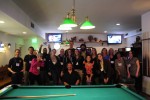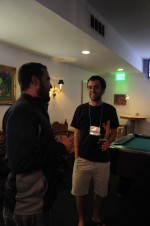The Long Term Ecological Research (LTER) Network had a large turnout from the coastal sites at the 22nd biennial conference of the Coastal and Estuarine Research Federation (CERF) November 3-7 in beautiful San Diego, California. CERF is dedicated to promoting research in estuarine and coastal environments to encourage their sustainable use and management. The theme this year was “Toward resilient coasts and estuaries, science for sustainable solutions” with many presentations focusing on coastal management techniques. The meeting kicked off with a wonderful presentation by Jerry Zucker, director of two popular films, Airplane! and Rat Race, about the portrayal of scientists in Hollywood and how we could better communicate our science. During the course of the week, U.S and International LTER scientists and students gave many great presentations and posters and participated in judging other science posters and presentations.
On Wednesday night, LTER affiliated scientists and students got together at the LTER social, organized and sponsored by Art Schwarzschild and the Education Committee, assisted by other scientists from the Virginia Coast Reserve (VCR) LTER. The social was a big hit, with a huge turnout from most coastal LTER sites including VCR, Florida Coastal Everglades (FCE), Georgia Coastal Ecosystems (GCE), and Plum Island Ecosystems (PIE).
The social was a great opportunity to network with students from other LTER sites and spur conversation about cross site collaborations, novel scientific ideas, and new research tools. For instance, FCE students learned about new uses of stable isotopes in tracking environmental perturbations applied in estuaries from their VCR counterparts, while VCR students in turn learned about FCE’s research tracking and identifying how large predators like sharks and alligators alter estuaries by redistributing nutrients and seeds.
Learning about research occurring at other sites—the basis for cross site synthesis activities promoted by the Network—is important for graduate students to understand and appreciate broader ecological processes. However, LTER sites can be separated by hundreds of miles, making meeting and interacting with LTER researchers from other sites quite challenging. Moreover, the LTER All Scientists Meeting occurs only once every three years, which means PhD students might have the opportunity to attend only one while masters students may miss the event completely. It is, therefore, important to find ways to expose graduate students to LTER science more frequently, and the LTER socials at National scientific meetings such as CERF provide a great opportunity to share information and learn about research at other sites.
The success of the LTER socials at both CERF and the annual Ecological Society of America (ESA) meetings are proof that putting students together in a non-professional setting can result in greater exposure for LTER science. We therefore urge established scientists and professionals to help host or organize events for LTER scientists at upcoming meetings. If you are interested in planning one of these events please contact Art Schwarzschild at arthur@virginia.edu.

 Enlarge this image
Enlarge this image
